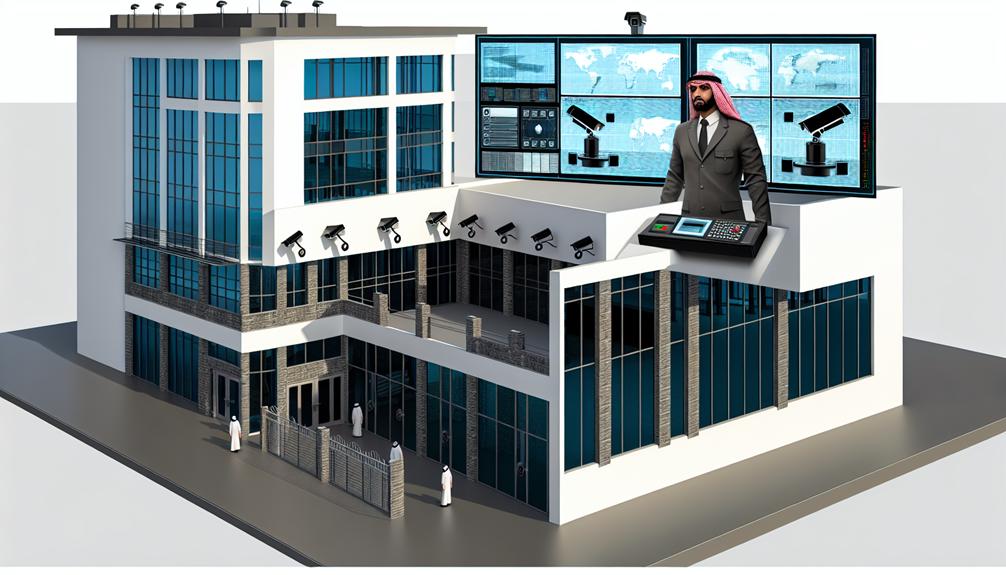To secure our NJ business with high-security locks, we need to adopt locks that protect against unauthorized access and breaches. High-security locks are designed to resist picking, drilling, and tampering, offering superior protection with intricate keyways and drill-resistant components. Unlike standard locks, they control key duplication, reducing risks. Opting for locks meeting standards like UL 437 or ANSI/BHMA Grade 1, and considering deadbolts or electronic locks based on specific needs, is crucial. Professional installation, regular security audits, and employee training enhance security further. By doing so, we can better protect our premises and maintain peace of mind. Discover more on optimizing security measures.
Key Takeaways
- Install high-security locks with patented key control systems to prevent unauthorized key duplication.
- Choose locks meeting industry standards like UL 437 or ANSI/BHMA Grade 1 for maximum security.
- Use deadbolts and electronic locks to provide robust resistance against forced entry and advanced access control.
- Conduct regular security audits and integrate locks with alarm systems for immediate breach alerts.
- Schedule periodic professional maintenance and employee training to ensure optimal lock functionality and security awareness.
Importance of High-Security Locks
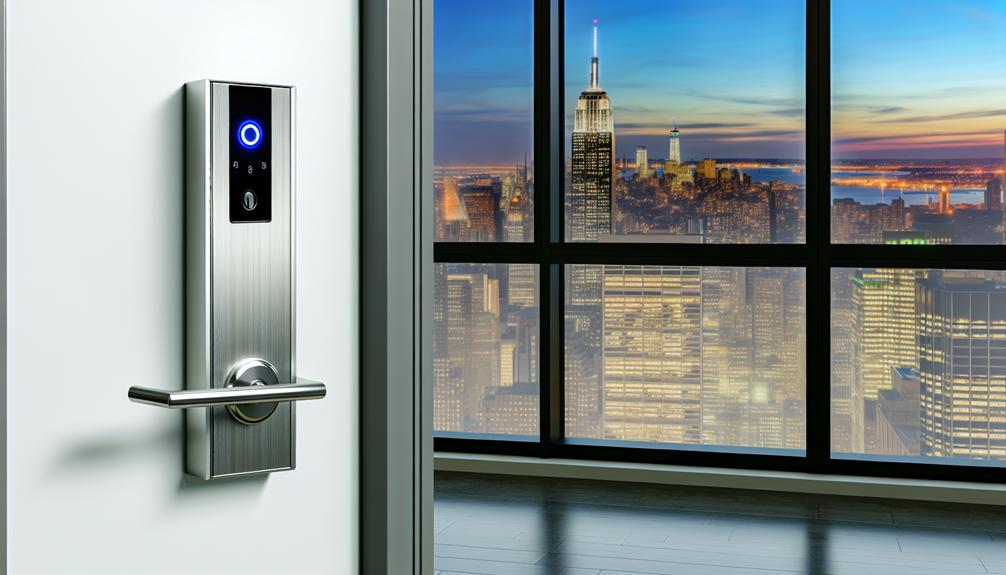
High-security locks are crucial for protecting our NJ businesses from unauthorized access and potential security breaches. These advanced locking systems offer robust security advantages by significantly decreasing the likelihood of break-ins. With the constant risk of theft and vandalism, high-security locks provide peace of mind through superior protection mechanisms.
We need to explore the various ways these locks improve our security. First, they utilize intricate keyways and locking mechanisms that are resistant to picking and bumping. This means criminals can’t easily manipulate the locks, thus preventing unauthorized access. Additionally, high-security locks often include drill-resistant housings and hardened steel inserts, which deter attempts at forced entry.
Risk prevention is another crucial aspect. By installing high-security locks, we reduce the risks associated with traditional locking systems that are easily compromised. These locks are specifically designed to withstand sophisticated attacks, ensuring the security of our assets and sensitive information.
Furthermore, high-security locks frequently come with patented key control systems. This restricts the ability for unauthorized key duplication, further strengthening our control over who can access our premises.
Essentially, embracing high-security locks is a proactive measure that strengthens our business against potential threats.
Differences Between Standard and High-Security Locks
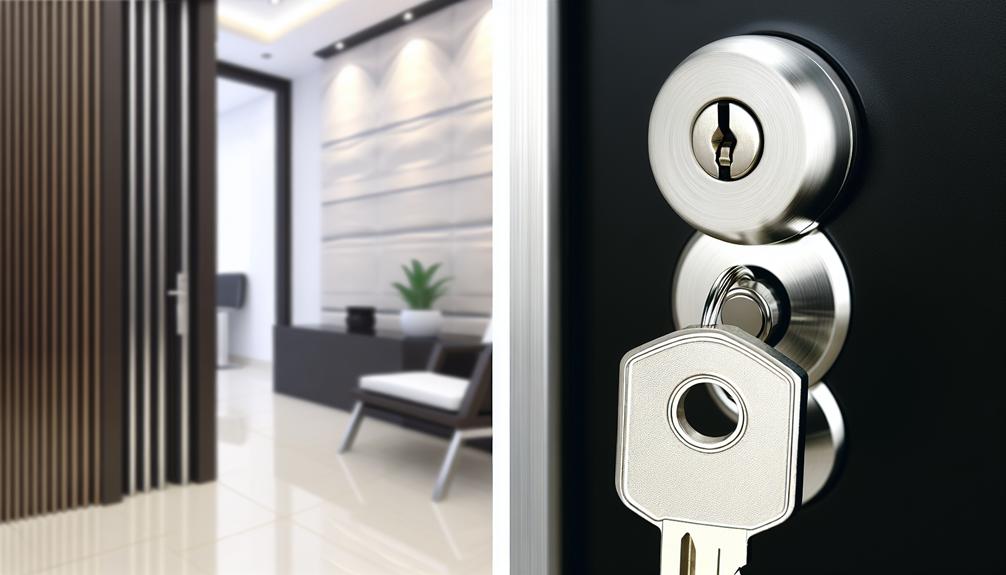
When comparing standard locks to high-security variants, we immediately notice notable differences in their construction and resistance to tampering. Standard locks often fall victim to common lock picking techniques and exhibit various security vulnerabilities that can compromise our business’s safety. These basic locks are more susceptible to forced entry and manipulation, making our assets and sensitive information vulnerable.
On the other hand, high-security locks are engineered to thwart these threats effectively. They incorporate advanced mechanisms that resist picking, drilling, and other tampering methods. The robust construction of high-security locks guarantees a higher level of protection against physical attacks, providing us with peace of mind.
Moreover, standard locks pose significant key duplication risks. Unauthorized copies of keys can be made easily, further compromising our security. High-security locks mitigate this issue by using restricted keyways, which can only be duplicated by authorized locksmith services. This control over key duplication significantly enhances our overall security posture.
Key Features of High-Security Locks
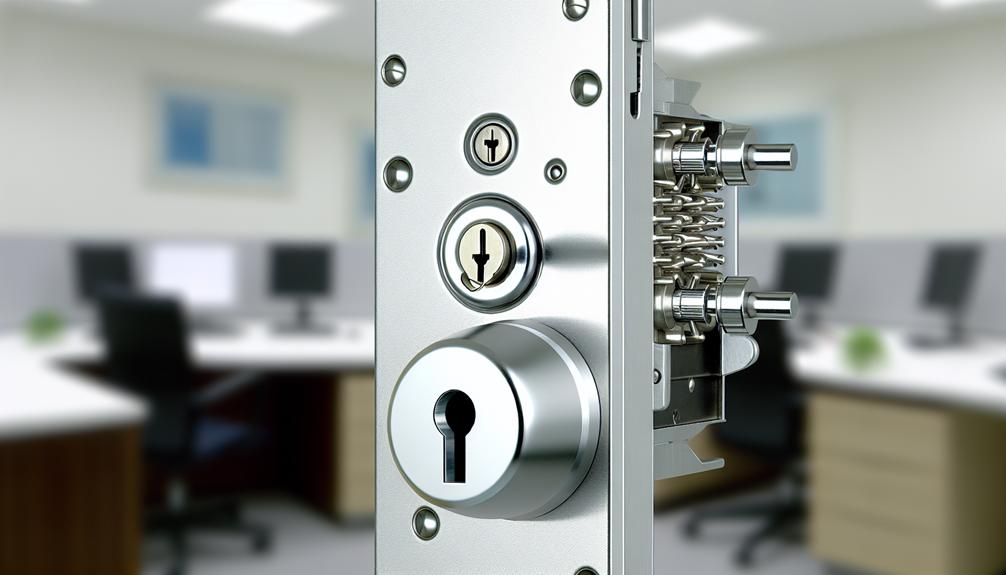
Understanding these contrasts underscores the significance of identifying the key features that make high-security locks a superior choice for safeguarding our business.
First, these locks are designed to resist common lock picking techniques, reducing security vulnerabilities to a great extent. High-security locks often feature intricate pin mechanisms and sidebars, making them incredibly difficult to manipulate without the correct key.
Another vital feature is drill resistance. Many high-security locks use hardened steel inserts that withstand drilling attempts, ensuring that our premises remain secure even against aggressive break-in tactics. Additionally, patented key control systems prevent unauthorized duplication of keys, granting us greater control over who can access our business.
Incorporating advanced technology, biometric access control and electronic keyless entry systems offer unmatched security. Biometric access control uses unique biological traits, such as fingerprints or retinal scans, providing a highly secure and convenient way to manage access. Similarly, electronic keyless entry systems eliminate the need for traditional keys, reducing the risk of lost keys and unauthorized access.
Choosing the Right High-Security Locks
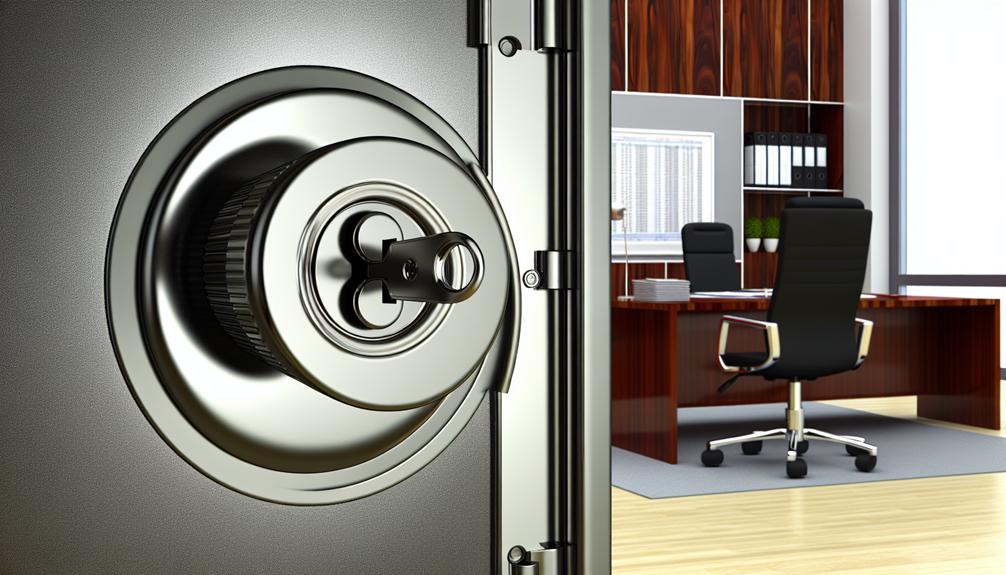
Selecting the right high-security locks is vital to ensuring our business remains protected against evolving security threats. We need to evaluate various lock types, from deadbolts to electronic locks, each offering different security levels.
Deadbolts, often seen as the gold standard for physical security, provide robust resistance against forced entry. However, electronic locks, with features like biometric access and audit trails, offer advanced control and monitoring capabilities.
When analyzing security levels, we should prioritize locks that meet or exceed industry standards, such as UL 437 or ANSI/BHMA Grade 1. These certifications indicate the lock’s ability to withstand picking, drilling, and other tampering methods. Additionally, we must consider the lock’s construction materials; hardened steel components offer greater durability and resistance to attacks.
It’s crucial to align our choice with specific business needs. For instance, areas containing sensitive information or high-value assets may require higher security levels and advanced lock types. Conversely, less critical zones might be adequately secured with standard high-security deadbolts.
Installation and Maintenance Tips
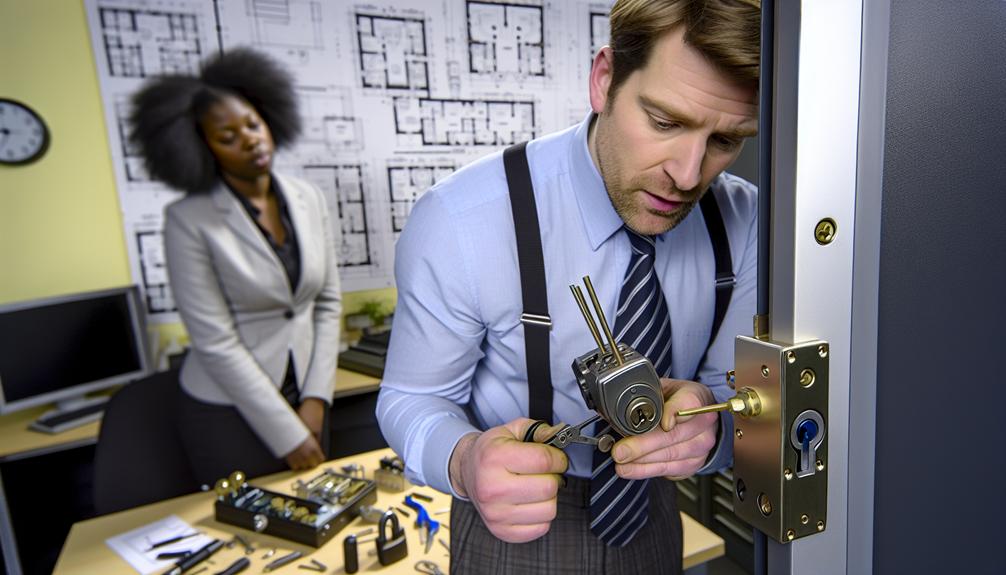
Proper installation and regular maintenance of high-security locks are vital to maximizing their effectiveness and longevity. We should always seek professional locksmith recommendations for installation to make sure the locks are correctly fitted and functioning. An improperly installed high-security lock can compromise the entire security system, making our business vulnerable.
Once the locks are installed, we must conduct regular security audits to identify any potential weaknesses. These audits, performed by a reputable security firm, will help us stay ahead of any threats and guarantee our locks remain tamper-proof.
Additionally, integrating these locks with alarm systems enhances our security measures, providing an immediate alert if unauthorized access is attempted.
Employee training is another critical aspect. Our staff should know how to properly use and maintain these high-security locks. Regular training sessions can prevent user errors and guarantee that everyone understands the importance of security protocols.
Lastly, consistent maintenance is key. Scheduling periodic checks with a professional locksmith will help us address wear and tear before it becomes an issue. This proactive approach ensures that our high-security locks continue to provide the protection we need for our NJ business.
Frequently Asked Questions
What Are the Costs Associated With Installing High-Security Locks?
When considering high-security locks, we need a cost breakdown, including materials and labor. The installation process varies in complexity, impacting costs. Investing upfront reduces long-term risk, ensuring our business remains secure and under our control.
Can High-Security Locks Be Integrated With Smart Home Systems?
Imagine seamlessly accessing doors with a smartphone. Smart technology integration with high-security locks addresses business security concerns effectively. We can monitor access remotely, ensuring control and reducing risks. It’s a sophisticated solution for modern security needs.
Are High-Security Locks Covered by Business Insurance Policies?
We need to check our insurance coverage details. Many policies cover high-security locks, especially if installed by professional locksmith services. It’s important to confirm specifics with our insurer to make sure we minimize risks effectively.
How Do High-Security Locks Affect Emergency Exit Procedures?
We need to walk a tightrope here. High-security locks must comply with emergency exit regulations to guarantee safety. Strict lockout procedures shouldn’t compromise our ability to evacuate quickly during emergencies, maintaining both security and compliance.
What Are the Leading Brands for High-Security Locks in the Market?
We recommend leading brands like Medeco, Schlage, and Mul-T-Lock for high-security locks. They offer advanced keyless entry options and integrate biometric technology, ensuring maximum control and reducing risks for businesses seeking robust security solutions.
Conclusion
In securing our NJ business with high-security locks, we’re not just adding a barrier; we’re constructing an impenetrable fortress.
Standard locks are mere speed bumps compared to the fortress-like resilience of high-security options. These locks are the guardians against the relentless tide of potential threats.
By choosing, installing, and maintaining these fortresses diligently, we’re ensuring our business doesn’t just survive but thrives in an environment where security is paramount.
Let’s make our business an unbreachable stronghold.

